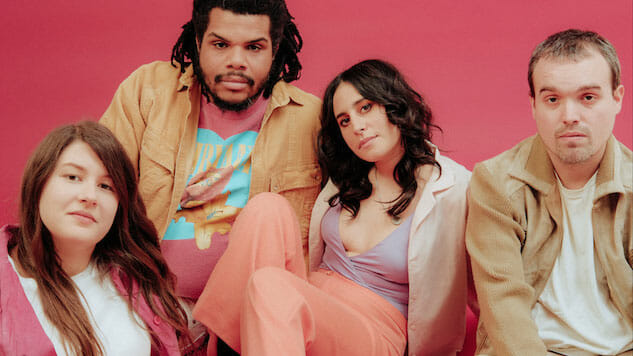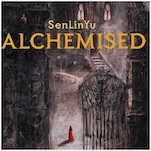Mannequin Pussy’s New LP Patience is a Kickass Emotional Reboot
Photo by Marcus Maddox
It’s been three years since Mannequin Pussy released a full-length, so patience is what brought us Patience—the Philadelphia punk outfit’s new album and one of the best rock releases of 2019 so far. The band’s first two albums—2014’s GP and 2016’s Romantic—are both under 20 minutes and feature speedy jolts of punk along with the occasional glimmer of dulcet-toned pop. But their new LP is crisper, poppier, longer and more fully realized than anything they’ve released before.
In a still-modest 26 minutes, Mannequin Pussy, led by frontwoman Marisa Dabice, dish out punk-pop that will make you want to hug your teenage self, but also fight on behalf of the adult you’ve become. Dabice opened up on this record in a way she hasn’t before. She sings about abusive relationships, self-hatred, and personal inadequacies, revelations she struggled with for years before ever talking about them. It’s a record that simultaneously pierces while forcefully standing its ground, rightfully taking up space. Patience begins with anxious heart racing, but concludes with the kind of heart racing we all strive for—that lovey dovey tingle you wish you could bottle and save for when you’re feeling cynical.
Dabice, along with Colins Rey Regisford (bass, samples, vocals), Kaleen Reading (drums, percussion), and Thanasi Paul (guitar, keys) also made one of the year’s most anthemic tracks in the form of lead single “Drunk II.” When Dabice forcefully, begrudingly admits, “I still love you, you stupid fuck,” you can already envision a crowd of forlorn fans belting that line in a basement venue on a Tuesday like they have nothing to lose. Dabice’s admission of not only subtle imperfections, but also deep-set, recurring inner turmoils, is immensely invigorating. Patience is the sound of liberation, and paired with melodic riffs that scream into the void just like Dabice, it’s also an emotional reboot you can rage to.
Paste spoke with Marisa Dabice about the emotional nuances of Patience, and why this album almost didn’t see the light of day. Read the interview below, which has been edited for clarity and length.
Paste: You’ve said you’re not a prolific writer, and you have to feel something to write. Did it take a while for these songs to come through?
Marisa Dabice: This time, the songs were ready, and we wanted to record. We just had a lot of shit I can’t get into too much. We had some legal barriers that prevented us from getting into the studio and making a record. So, that’s where that title comes from. For the first time, I wasn’t waiting for inspiration. I was waiting for contracts to sort themselves out.
Some of these songs are considerably longer than the minute-long songs you’ve put out before. Do you just follow where the songs take you in terms of the track lengths?
Definitely. That’s not really something I consider too much when I’m writing a song. I’m not concerned with brevity. It’s just naturally how I’ve written before. So I think this is just one of those things where I’m learning more as a songwriter and musician. Now I’m experimenting a little bit more on the tracks, and they’re able to come to life in a different way. I think this is one of the first times we were able to really take our time on a record, so having that experimental aspect to it where we could add a two-minute outro to a song. It’s just something we’ve never done before. I’m definitely not done writing minute-long songs, but I would bet that the next record would be even longer.
You recorded this album twice. What happened the first time around?
We recorded our record with the same people that we did Romantic with. And when we were listening back to it, we just felt by virtue of recording in the same space with the same people, with all the same equipment, the songs really started to sound like—I think it would be way too harsh to say Romantic b-sides, but the sounds were just so similar to what we already heard ourselves create. So after that experience we’re like, “Alright, we need to figure out another way to make this record.”
The first single, “Drunk II ” talks about coping mechanisms and the difference between how you carry yourself and your actual inward emotions. Do you often worry about burdening other people with your problems?
All the time. I’ve been that person that my friends can turn to and I’m there for them and I want to hear what they’re going through. But when it comes time for them to be like, “What’s going on with you,” I just have always really struggled to be able to articulate any emotion at all. I tend to like really clam up when put on the spot to discuss those things. So that’s why songwriting has been this beautiful practice for me to get in touch with how I’m really feeling about something and spend my time on it because usually when I’m put on the spot, I have a much harder time stringing the words together.
“Fear/+/Desire” is also a very personal song, and it’s presumably about an abusive relationship you’ve experienced. Why do you feel like music is an easier vehicle for you to express those feelings?
I don’t know. It’s strange to feel that way when music actually becomes this very public thing. I can’t understand why it’s easier for me to put something into a song than it is for me to talk about with the people who are actually closest to me. It’s not really something I’ve discovered or been able to work out yet. But I’ve spent a majority of my life feeling very alone in what I’ve been going through. So every time I’ve put out a song, you put those experiences in it, and it seems to reach someone who needs to hear it. Maybe I’m just making music that I wish I had been able to hear myself to get me through that time.
It seems like you frequently reference this ideal version of yourself. Do you often compare yourself to that better version, and does that discrepancy frustrate you?
I’m not too frustrated by it. I get more frustrated when I’m comparing myself to other people. That frustrates me much more than feeling like I’m going back and forth with who I am. As I’ve grown older, I’ve become much more comfortable with who I am as a person and the person I want to be. When people are like, “Would teenage you be proud of you,” I think yes. I think teenage me would be fucking hyped on who I am and who I’ve become, but I’m not special. I’m like everyone else. I’m self-loathing and can be full of self hatred, and I compare myself to other people. I don’t think any of that does anyone a service.
The song “Clams” is about some financial disagreements. Is that a record label thing? I know you might not be able to get into it.
I never signed anything saying I can’t get into it. I’m just trying to figure out the most respectful way to go about this at this point. We felt very held back. We had a very limiting contract situation, which is a cautionary tale for a lot of bands. It kind of got fucked over on a handshake deal. It has to do with like label drama and the root of why it took so long for this record to come to life. There were so many times in this process where I thought that this was just never going to happen. “Clams” was the perfect song to put that frustration into.
It seems like on this album, the pop stuff is a bit poppier but there are still lots of thrashing punk moments. How did those sounds develop?
A lot of that probably is a testament to the talents of [producer] Will Yip. He’s really able to make a song sound exactly how you envisioned it when you were describing it to him. He’s a very clean guy in the way that he records. I was like, “I don’t want to lose being this kind of like nasty fucked-up sounding band because there’s still a lot of anger here and I don’t want to gloss all over that and pretend it isn’t there.” He did a great job getting that balance between the two. It’s also just being able to realize like, “Oh shit, I can write a pop song. I can write a punk song. I can write whatever the fuck I want to.” I really don’t like that a lot of bands are held to the standard that they are supposed to be one thing. It’s just so limiting, and creatively that’s so boring.
Is it liberating to tear yourself down and build yourself up within the same album?
Definitely. Writing this record over a period of two years, that’s how long it takes sometimes to go through those emotions and really find yourself on the other end of it. There’s songs I never wanted to write about on this record in terms of abusive relationships and just all the shame that I felt from finding myself in those situations. I always thought I was a much smarter person than to find myself in a situation like that. And when it happened to me and I couldn’t just get out of it quickly, I just filled up with so much shame and was unable to talk to anyone in my life about it because it just didn’t match up with the way that people saw me. And it didn’t match up with the way I saw myself. So it was incredibly frustrating for two or three years, going through this where I started to see myself as this weak person because this happened to me and then slowly coming out the other end. Sometimes the beauty in taking your time on a record is that you are able to go through that whole emotional cycle where you start to see yourself as nothing but a pile of shit and then all of a sudden, you feel so on top of your shit.
How do you view this point in the band’s career?
It’s strange. We’ve been a band longer than many bands seem to exist, and I still feel like we’re just getting started.
In what sense?
I think we have a lot more albums to make. We’ve already started demoing songs for the fourth record. So I know this is kind of the beginning for us, but you never know sometimes how far an ending is, or a beginning, either.
Patience is out on June 21 via Epitaph Records. You can purchase the album here, and view their upcoming tour dates here.







































